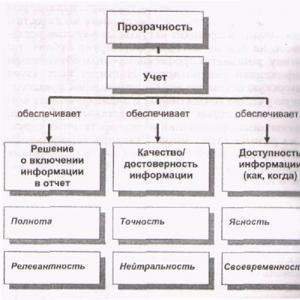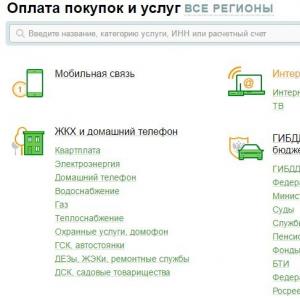Directions of radio electronics. How much does a radio engineer earn in Russia and other countries
Description
Bachelors-radio technicians are trained to perform highly professional duties in the field of:
- implementation of an early comprehensive analysis of the economic, interface and technical properties of programs for the production and development of radio equipment and their systems;
- preparation and study of the initial information used in the calculation of physical characteristics and design of elements, devices and assemblies;
- integrated operation and high-quality service maintenance of electronic devices;
- restoration of operability and debugging of settings of radio engineering devices;
- formation of requests for the supply of the necessary technological equipment and spare parts;
- creation of technical documents for repaired devices;
- development of recommendations for the service and use of software equipment and tools;
- assessing the timeliness and relevance of the projected radio engineering facilities;
- coordination and arrangement of the production process;
- implementation of supervisory functions for safety at production sites and the quality of manufactured devices.
Who to work
The bachelor will be able to work as an engineer in the direction of: radar; telecommunications; communication; microelectronics; circuitry; electricians; radio; At production sites, he can perform control duties over the quality of production of electronic equipment and instruments. Bachelors can often be found among programmers-developers, radio installers and radio electronics engineers. In places professional activity are enterprises that manufacture radio, television equipment and instruments. Thanks to the development of the telecommunications sector, a large number of organizations have emerged that develop telecommunications and satellite systems. Their staff also regularly requires qualified personnel.
Radio engineering is a specialty that many associate with repairing receivers and soldering huge circuits. This stems from distant memories from Soviet times, when almost every boy had his own little radio workshop. However, do not give in to prejudice.
Now is the age of great changes and technological progress. Hundreds of new models of electronic devices enter the market every day. They all need proper adjustment, and sometimes even repair. And radio engineering is just the science that can help in this. But let's talk about everything in order.
Radio engineering: specialty or vocation?
As stated earlier, most people judge this science by looking back at examples from the past. Then many radio engineers mastered this direction on their own, experimenting on old tape recorders and reading the works of famous engineers. However, only a few decided to enter an institute in this specialty, since they did not see the potential in this profession.
Now everything has changed dramatically. Instruments have become more complex, and good books have become a real shortage. And, in fact, no matter how excellent a specialist a person is, it is clearly impossible to get a job without an appropriate diploma. Therefore, radio engineering is primarily a profession, and a passion for electronics is just a pleasant addition to it.
How to become a radio technician?
It is curious that radio technician is a common expression. In professional language, this profession is simply called "technician". However, you must admit that the first word is much clearer, since it fully explains the essence of a person's work.

In general, radio engineering is a specialty that is divided into two broad categories: design and maintenance... You can get the necessary education both at a technical school and at an institute. And yet the second option is much better, as it will allow you to acquire an "crust" of the engineer.
It should be noted that radio engineering is a specialty that not everyone can master. This is due to the large amount of information that the future specialist must study. Otherwise, he will not be able to work normally in the future, let alone raise his qualifications on his own.
Features of the profession
First, let's talk about what qualities a person who wants to master radio engineering should have. So, he needs:
- have analytical;
- love to work with technology;
- be able to sit motionless for a long time;
- have good hand motility;
- be able to concentrate.
It should also be noted that this profession requires constant self-improvement. Indeed, over the years, the knowledge gained at the institute loses its relevance, as completely new models of devices enter the market. Consequently, a radio technician must constantly deepen his knowledge and delve into technical innovations.

Specialty radio technician: who to work after training?
After many years of training have been left behind, a well-grounded question arises about where to go to work. So, radio engineering is a specialty, reviews of which are rather controversial. Some claim that it is quite easy to find a job in this profession, others say the opposite.
However, after a little investigation, you can come to the following conclusion: a radio technician has a very high chance of finding a promising job. After all, this is a rather rare specialty, and few dare to master it. As for specific places, there is a small list of suitable vacancies:
- State enterprises for the production of radio equipment: average salary.
- Computer stores and repair centers: Average salary.
- Design bureaus and institutes: high wages.
- Various commercial structures and agencies: salaries are above average.
- Setting up field beacons and maintaining oil radio towers: the salary is very high.
The profession of a specialist who is responsible for assembling, setting up and testing equipment and radio technical devices is called a radio technician who is this, what are his duties - read on.
What you need to know about the profession
If we consider the features of the profession of radio technician, then it will be a specialist who understands the products of radio and instrument engineering.
- He should not only be well versed in various schemes. Be able to repair and maintain radio electronic devices and systems. And certain categories of specialists can independently carry out the design and installation of circuit diagrams.
Main professional responsibilities
A specialist can be involved in the repair or maintenance of various types of electronic devices. They can work as developers and designers of various types of apparatus. In this case, it is required that the specialist has a secondary specialized or higher education.
If necessary, the radio technician will be responsible for organizing and assembling various types of radio engineering devices, as well as their systems. Involved for setting up. For this, the development of electronic thought and technical documentation should be monitored.
After all, electronic technologies are in the stage of active development, and therefore it is required to constantly improve and, if necessary, improve their qualifications.
Besides, the functional duties of a radio technician may include testing new systems and electronic equipment.
Professional qualities of a specialist
- has an interest in various techniques;
- shows engineering skills;
- likes to do manual labor;
- have high intelligence;
- have a good memory;
- be able to concentrate on details;
- have perseverance.
In addition, professional radio technicians begin to sense the electronic devices around them. They are more attentive to them. Distinguish the slightest deviation from the norm, imperceptible by most users.
Besides, it won't be so easy to become a professional. ... After all, great results can be achieved by those who, from childhood, are passionate about not just using, but studying the principles of operation of electronic equipment and devices. If you learned to work with a soldering iron and figured out the printed circuit boards, combining them to obtain a certain result.
A professional radio technician must:
- perfectly know and understand the basic laws of physics;
- have engineering skills;
- understand the principles by which devices work;
- in some cases, the design skills of a specialist may be required;
- be able to produce high-quality installation and service;
- the ability to read is required, as well as to create circuits of electronic devices;
- master the soldering iron perfectly;
- be able to carry out diagnostic actions in relation to equipment;
- know the basic computer programs used for various work related to diagnostics and design.
Output
Having received a diploma and qualification as a radio technician, a specialist must continue self-education and advanced training, in order to maintain his place among radio technicians who is this , what should be able to - we examined in this article.
(function (w, d, n, s, t) (w [n] \u003d w [n] ||; w [n] .push (function () (Ya.Context.AdvManager.render ((blockId: "RA -329917-3 ", renderTo:" yandex_rtb_R-A-329917-3 ", async: true));)); t \u003d d.getElementsByTagName (" script "); s \u003d d.createElement (" script "); s .type \u003d "text / javascript"; s.src \u003d "//an.yandex.ru/system/context.js"; s.async \u003d true; t.parentNode.insertBefore (s, t);)) (this , this.document, "yandexContextAsyncCallbacks");
A radio technician is a household, colloquial designation of a specialist in instrument making. The official name of the specialty is radio apparatus engineering.
This profession is related to the profession of radio mechanics. The difference is that a radio technician is able not only to repair electronic devices and systems, but can also design them independently.
If for the repair and maintenance of radio electronics, usually (although not always) the initial vocational education, then hardware engineering requires at least secondary specialized education
Like any other technology, electronic equipment is undergoing changes, it is being improved. To assemble an electronic device, you need to perform a lot of manipulations. Installation operations (electrical connection of individual elements of equipment) are final. This procedure is performed by radio technicians.
They are engaged in the assembly and tuning of radio devices and electronic equipment. The radio technician installs external radio components on the boards (special diagrams with designated places for fastening parts and the location of wires), performs node assembly and electrical installation according to wiring and schematic diagrams, assembles units on a chassis and inter-node electrical installation, using soldering, gluing, wire and printed wiring.
Personal qualities
This profession is for those who like working with equipment, digging into small details. For the attentive and diligent.
Education (What you need to know?)
Fundamentals of radio and television technology, principles of operation and operation of equipment, rules for repair, tuning and adjustment of radio and television equipment, rules for using control and measuring instruments.
The most important thing in this work is to understand how the processes occur within this or that apparatus, to be able to think logically. After all, radio magnetic waves and radio beams are invisible and intangible things, however, you need to be able to imagine their movement and propagation.
Place of work and career
It is not difficult to find a place - radio engineering services are needed today at any medium or large enterprise. These are factories that produce various equipment (from household appliances to military ones), scientific research institutes, medical institutions, video and audio salons, and television studios. Many college graduates go to work in the rapidly developing field of cellular communications, where there is a lack of specialists who understand radio electronic equipment.
Related professions:
Where to study?
| Universities by specialty | Specialty | Forms learning |
Cost per year (rubles) |
Checkpoint score (2018) |
Ural Technical Institute of Communications and Informatics (branch of GOU VPO "SIBGUTI" in Yekaterinburg) |
Radio engineering |
Full-time (4 years) |
free (8 seats) |
|
Graduate School of Electronics and Computer Science |
Full-time (5 years) |
free (16 seats) |
||
Electronic systems and complexes |
Full-time (5 years) |
free (45 seats) |
||
Institute of Radio Electronics and Information Technologies - RTF |
Radio engineering |
Full-time (4 years) |
free (40 seats) |
|
| Colleges and technical schools by specialty | Specialty | ||
Good day, members of the forum. I would like to ask you the following question. I am a 4th year student with a degree in radio engineering. I chose deliberately, according to the mindset and personal preferences, everything was in order. I have completed my studies until now, and soon I will receive a diploma, but there is no particular zeal in mastering the profession. Many times I tried to fight this (during periods of motivational upsurge), borrowed books, looked for various thematic forums, articles, tried to abstract from everything that distracted, but all this rested and rests on several things. Finding something suitable to start learning is difficult. An area that is more or less interesting (reception and processing of signals, DSP) is deprived of literature that smoothly introduces the subject. Literally today I entered a request "DSP" or "signal processors" on youtube with a desire to watch some lessons, but I could not find anything in Russian. Yes, I can watch lectures in English, but the very fact of the lack of information is depressing. There are very few thematic sites where information could be gleaned, and if they are, they are so antediluvian that it hurts your eyes at one glance. No developed community, nothing that could stir up interest. Even when I manage to come to terms with it, I remember the number of vacancies. And everything is not very fun there.
It is worth saying that the university has secured me in one enterprise, where I do research work, while simultaneously performing simple (not for beginners) tasks. Most of them are programming algorithms for receiving signals from satellites, etc. I had to make programs with a windowed interface in RAD Studio, which, in principle, fascinated me. In addition, programming was interesting for me since school, but when I decided that I would go to such an area as radio engineering, I dropped everything related to IT and did not develop much there.
For the last half year, I have been rushing about in doubts - to come to terms with the inconveniences that are in my current profession, or to go where my soul lies. (I'm afraid to speak with confidence, because once I was sure that I was not mistaken in choosing radio engineering). During the fall, I completed two online courses for a certificate with honors in C ++ and computer architecture. I understand that this is the very starting base. The second course is completely introductory. But I didn't feel any dissonance. I performed tasks with enthusiasm and on time. What is this, if not an inclination and interest in this area? The abundance of information is also pleasing. For self-education, it is a paradise. Take it and learn!
I ask you for advice on what to do? Is it worth it to give up and go where it turns out to develop productively and with interest, or to stay put with some discontent and constant struggle with oneself?







